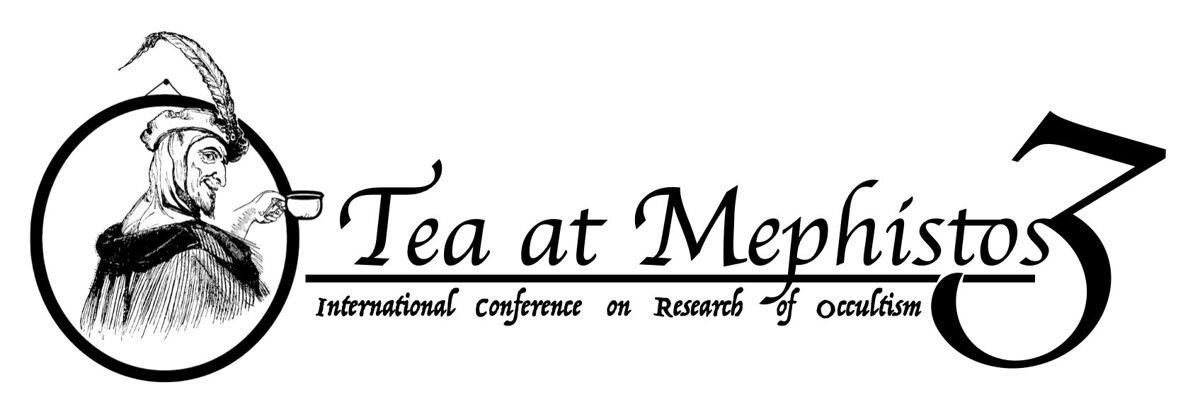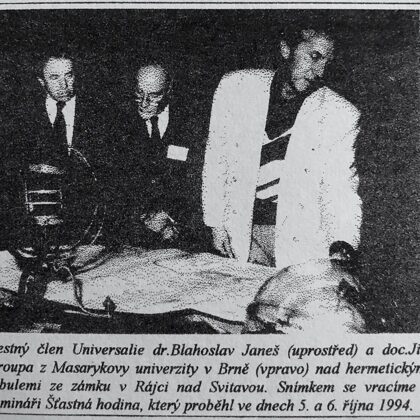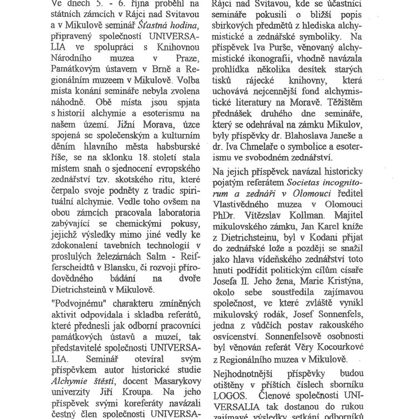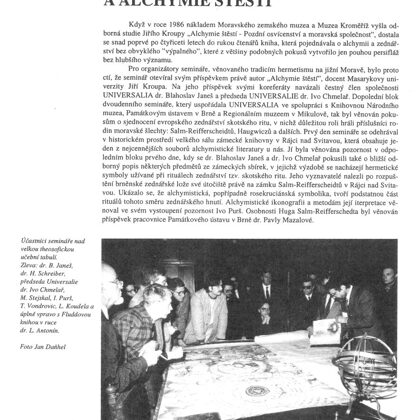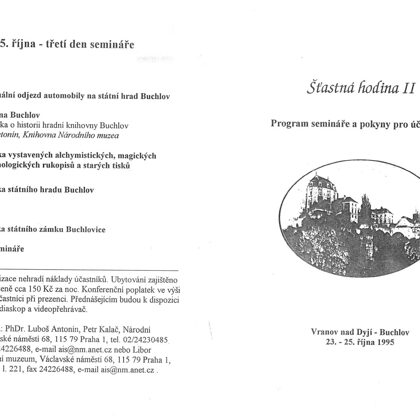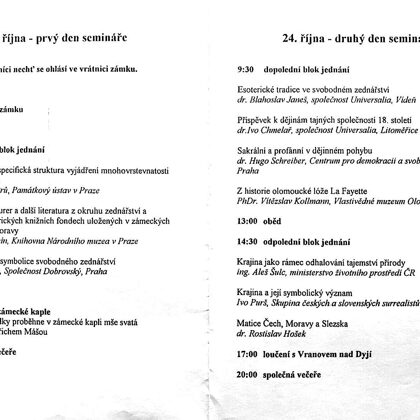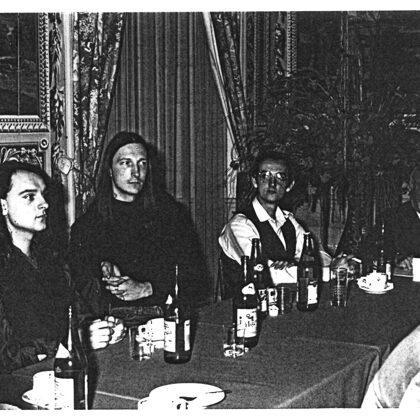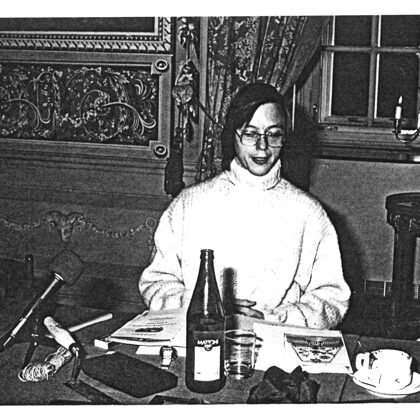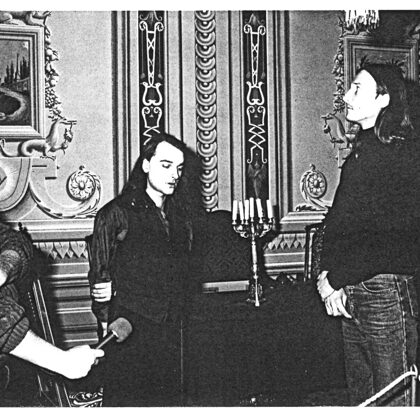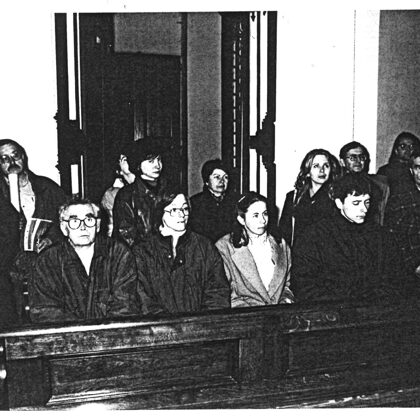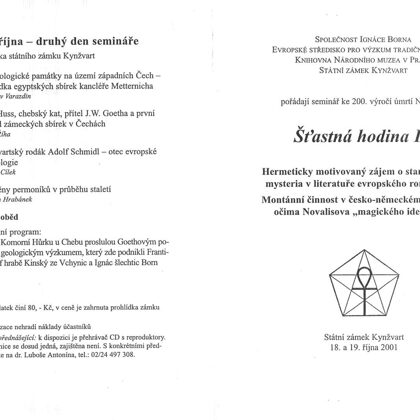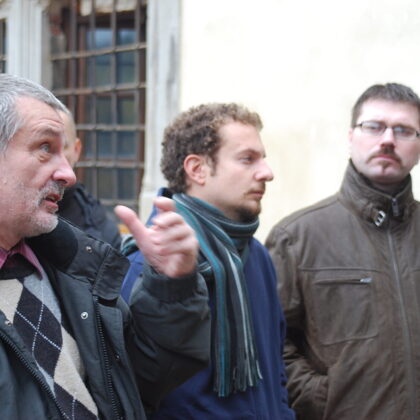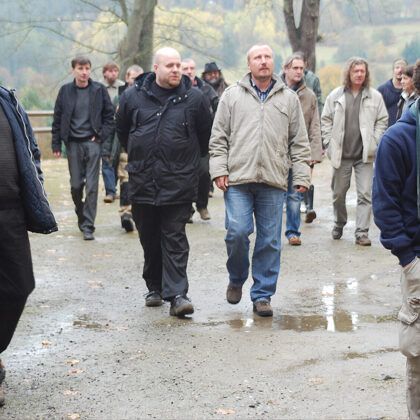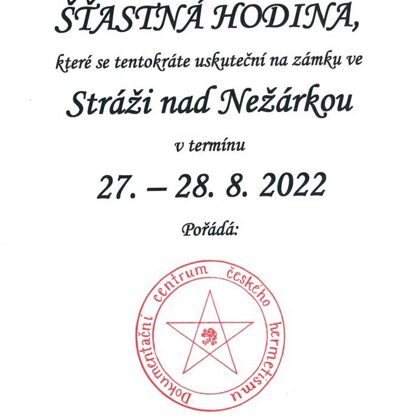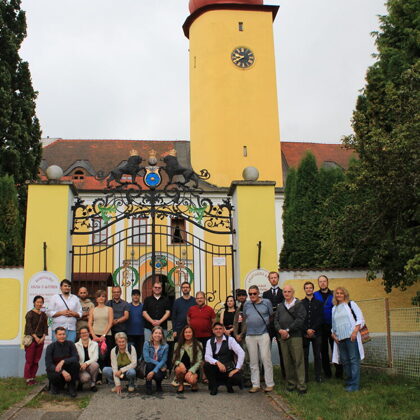History of the Conference
Tea at Mephisto's
The goal of the
conference is threefold:
1. to create a place,
where scientists from different fields can present their thematic
research and share their experiences.
2. to create
a place, where scientists and occultists can meet each other,
exchange opinions and initiate cooperation.
3.
to popularize research among the general public and explain
its reasons and significance.
The Tea at Mephisto's conference originated in Brno in 2023 as a result of several years' effort to revive the lost tradition of Czech professional events and conferences. One of the most famous was the Happy Hour, founded in the mid-90s by the librarian of the National Museum Library PhDr. Luboš Antonín, PhD. (*1952 - †2016). And it was the memory of the Happy Hour that inspired those who, 29 years later, stood at the creation of the Tea at Mephisto's conference. So, let’s start the story of the conference's origin with it.
The Original Happy Hours
The idea for the Happy Hour originated in 1994, when the aforementioned Luboš Antonín proposed it. It was a scholarly seminar for those interested in Hermetic, Martinist, and Masonic themes, founded on the notion that it was a place for meeting, exchanging experiences, and mutual inspiration. Therefore, the seminar was not held in a specific place, but to support local researchers and authors, it traveled across the country. It was always hosted by some castle, manor house, or other landmark. Initially, this had a practical reason. Participants of the seminar were interested in the books and archives with occult themes stored there, or in the occult-inspired decor and renovations. But the atmosphere of these places also lent the Happy Hour its unique charm, thus location choice eventually became key.
The first Happy Hour subtitled "Intellectual currents in the circles of the Moravian nobility in the 17th and 18th centuries," took place on October 5-6, 1994 at the castles Rájec nad Svitavou and Mikulov. Each day a different castle. Thematically, it followed on a successful exhibition Regnum alchymiae with a focus on Freemasonry issues. Between 1995 and 2016, five more Happy Hours took place. Host sites included state manors Vranov nad Dyjí and Kynžvart, as well as Buchlov and Bečov nad Teplou castles. Metallurgy and alchemy were discussed in the Sankturin House in Kutná Hora. Topics of the Happy Hour ranged from the occult interests of the Czech nobility, through influences of occult ideas on architecture to Ancient Egyptian motifs in European Romanticism. The last of the original Happy Hours then took place on October 15, 2016 at the Carpet Diem café near Flóra and served as a memorial for the prematurely deceased author of the whole tradition Luboš Antonín.
The Effort to Revive
Without its author and main organizer, the Happy Hour ceased to exist. As time passed, other
similar seminars and conferences also disappeared. Partly this was due to a generational change, partly for other reasons. The last of them, a traditional religious studies conference at HTF CUNI, which focused on esotericism and
alternative religiosities for years, organized by ThDr. Marek Dluhoš, Th. D., disappeared during the COVID pandemic. This was a
major blow to the academic and practical scene in the Czech and Slovak Republics.
Thus, proposals
to revive the tradition of Happy Hours began to appear. The initiative was taken by Petr Kalač
from DCČH, who convened a new Happy Hour in Stráž nad
Nežárkou in 2022. Happy Hour VII
took place on August 27-28, 2022, at the local castle, symbolically on the occasion of 130 years since the local baron
Adolf
Franz Leonhardi (*1856 - †1908) brought Martinism and Theosophy to the Czech
lands, thus kickstarting the renaissance of Czech
occultism. The revived Happy Hour continued the basic idea and choice of its venue from its predecessors,
but it was more of a conference in form. Here, a shift of people from the defunct conference at HTF CUNI occurred, and both days during which
the Happy Hour was held were filled with a diverse mixture of lectures,
workshops, and activities. Among the speakers
were Jan Ševčík, Pavel Horák, Libor
Koudela, Martin Stejskal, Samuel Zajíček, and others. The conference
was accompanied by the Baroque guitar of Martin Křehnáč.
Creation of the Brno Conference
Still in Stráž nad Nežárkou, a discussion among participants of the Happy Hour took place, where the next edition should be held and what it should be like. The proposal of Brno historian of occultism Mgr. Jan Ševčík was accepted, to hold the next Happy Hour in Brno and this time openly as a public conference, inviting scientists, occultists, and the interested public. The aim of the proposal was to definitively fill the void that had existed on the Czech-Slovak scene since the demise of the last of the public professional events.
Preparations for the conference started early in 2024 under the leadership of Jan Ševčík, who gathered around him a ten-member organizational team. In it were represented scientists, occultists, but also experts of completely different interests, who wanted to help with the creation of a unique event. For example, historian Mgr. Ondřej Varaďa, expert on Voodoo Mgr. Veronika Šulcová, religionist Mgr. Olga Čejková, IT CEO Pavla R., a pair of experts on folk magic Markéta Oskeruše and Šanna Inka and others. Also part of the team was the initiator of the Happy Hour revival, Petr Kalač, who lent its name to the Brno conference.
Most of the organizers had experience with organizing larger-scale conferences and events, which significantly professionalized the preparation of the Happy Hour. Preparations were carried out in teams according to the knowledge and specializations of the organizers. For the first time, special websites were created, social networks were used for the first time, and communication with the media began. Foreign guests from practice and universities were invited. A special group of interpreters was allocated for their care. A live broadcast of the conference lectures on YouTube and Facebook was prepared.
Cooperation on the conference was invited Jiří Mahen Library, which provided the spaces of Jiří Mahen Memorial and ensured the technical equipment. Jiří Mahen Memorial is a picturesque historic villa with a garden, where Jiří Mahen (*1882-†1939), a Brno writer, playwright, and director of the city library, which today bears his name, lived. Furthermore, the association of historians Historia Europeana was invited, which contributed organizational experience and helped with administration. The catering was enthusiastically taken care of by the teahouse the Way of Tea, which also participated in the accompanying program. The organization of the accompanying program was further participated in by the dance group Friday Dancers and the media project Liquid Landscape. They all became co-organizers of the conference. For the conference, a very solid base was created and gradually a broader community of people formed around it, who helped with the preparations and the actual course. From this later emerged the Network.
The Brno Conference took place under the name Happy Hour VIII on October 27-29, 2023 and was a great success. 62 people from 7 countries, incl. representatives of universities from the Netherlands, Hungary, Austria, and finally also Rome and Paris attended in person. 17 lectures over 5 sessions were presented. One of the sessions was an international block, with English as the lecture language. Foreign guests had simultaneous translation provided. The live broadcast of the conference on YouTube and Facebook was followed by over 307 people. The opening speech was delivered by the vice-chancellor of Masaryk University, Prof. Jiří Hanuš, among the foreign guests mention Prof. György E. Szönyi from the University of Szeged, historian Dell Rose from the University of Amsterdam, and archaeologist Marion Vrbicky from Vienna. Lectures by a number of exceptional personalities, such as Ivo Chmelař, Matouš Mokrý, Olga Rosenkranzová, Róbert Adamec, Jan Krása, Leoš Kyša, Lenka Příplatová and others were featured.
Tea at Mephisto's
The unprecedented success of the conference left its organizers with the question "What next?" The Happy Hour was originally conceived as an irregular traveling seminar, highlighting research-worthy locations and supporting local researchers and groups. This concept is valuable, and it's great that such an event has been revived. However, continuing to travel would mean leaving behind the facilities that have been established for the conference in Brno, disbanding the cohesive organizational team, and ending the partnerships with institutions and organizations. Additionally, the format of large public conferences is not suitable for constant relocation. The organizers ultimately resolved the dilemma in the only logical way - by splitting the Happy Hour into two separate events. This solution was possible also because the Brno conference had become so well-known that it could exist independently.
The name Happy Hour remains for a smaller traveling event, which is currently organized by Petr Kalač together with local volunteers. In this form, Happy Hour is again a traveling seminar intended for a smaller number of invited experts. The focus of the seminar has narrowed to hermetic, Martinist, and Masonic topics, to which greater attention is given.
The rest of the organizational team decided to continue organizing further editions of the Brno international conference. They named it Tea at Mephisto's, which refers to the mysterious theatrical drama Mephistopheles (1910), written and staged by Jiří Mahen, in whose villa the Brno conference is repeatedly held. Currently, preparations for the third edition of the conference, Tea at Mephisto's 3 (2025), are in full swing. The preparations are organized by The Network and 9 associations and institutions. The main organizational team now has 16 members.
